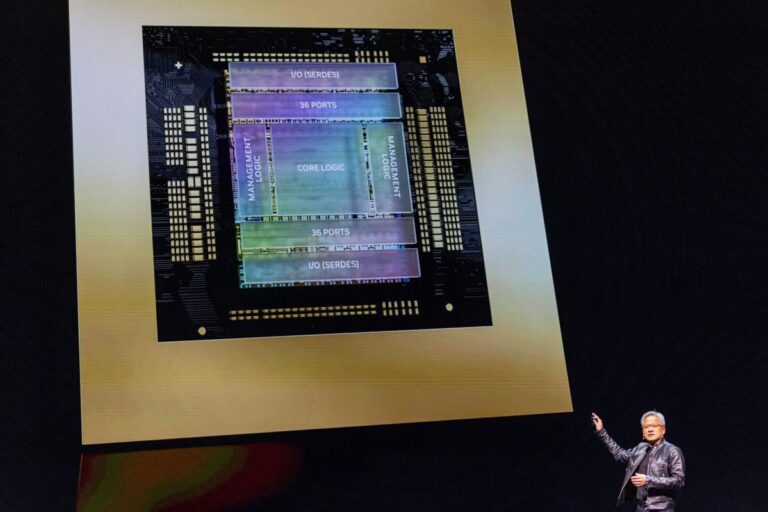(Bloomberg) — Biden administration officials discussed capping sales of Nvidia Corp.’s advanced AI chips. and other U.S. companies on a country-specific basis, people familiar with the matter said.
Most read on Bloomberg
Subscribe to the Bloomberg Daybreak podcast on Apple, Spotify or wherever you listen.
That approach would set a cap on export licenses for certain countries in the interest of national security, according to the sources, who described the private discussions on condition of anonymity. Officials are focusing on Persian Gulf countries that have a growing appetite for AI data centers and the means to finance them, the sources said.
Deliberations are in their early stages and remain fluid, the sources said, noting that the idea has gained traction in recent weeks. The policy would build on a new framework aimed at easing the licensing process for shipments of AI chips to data centers in countries including the United Arab Emirates and Saudi Arabia. Commerce Department officials unveiled those regulations last month and said more rules were coming.
The agency’s Office of Industry and Security, which oversees export controls, declined to comment. Nvidia, the market leader in AI chips, also declined to comment, as did Advanced Micro Devices Inc. A representative for Intel Corp., which also makes such processors, did not respond to a request for comment.
Nvidia shares fell 4.2% on Tuesday, following Monday’s record close.
A White House National Security Council spokesperson declined to comment on the negotiations, but pointed to a recent joint statement from the United States and the United Arab Emirates on artificial intelligence. In it, both countries recognize “the enormous potential of AI for good,” as well as “the challenges and risks of this emerging technology and the vital importance of safeguards.”
Setting per-country caps would strengthen restrictions that originally targeted China’s artificial intelligence ambitions, as Washington considers the security risks of AI development around the world. The Biden administration has already limited shipments of AI chips by companies like Nvidia and AMD to more than 40 countries in the Middle East, Africa and Asia, fearing their products could be diverted to China.
At the same time, some U.S. officials have come to view semiconductor export licenses, particularly for Nvidia chips, as leverage to achieve broader diplomatic goals. This could include asking key companies to reduce their ties to China to gain access to US technology – but concerns extend beyond Beijing.
“We will have to have a conversation with countries around the world about how they plan to use these capabilities,” Tarun Chhabra, senior director for technology at the National Security Council, said at a forum in June without naming of specific countries. “If you’re talking about countries that have a really robust internal surveillance apparatus, then we have to think: How exactly are they going to use those capabilities to strengthen this type of surveillance, and what will that look like? »
There is also the question of how the global development of AI could affect U.S. intelligence operations, said Maher Bitar, another NSC official. “What are the risks, not only in terms of human rights, but also in terms of security and counterintelligence, to our personnel around the world? » Bitar said at the same event.
It’s unclear how major AI chipmakers would respond to additional U.S. restrictions. When the Biden administration first issued sweeping chip regulations for China, Nvidia revamped its AI offerings to ensure it could continue selling into that market.
If the administration moves forward with per-country caps, it could prove difficult to implement a new comprehensive policy in the final months of President Joe Biden’s term. Such rules could be difficult to enforce and would pose a major test for U.S. diplomatic relations.
WATCH: The Surprising Origin Story of Nvidia’s AI
Governments around the world are seeking so-called sovereign AI – the ability to build and operate their own AI systems – and this quest has become a key driver of demand for advanced processors, according to Jensen Huang, CEO of Nvidia. Nvidia’s chips set the benchmark for data center operators, making the company the world’s most valuable chipmaker and the biggest beneficiary of the AI boom.
China, meanwhile, is working to develop its own advanced semiconductors, although they still lag behind the best U.S. chips. Still, U.S. officials worry that if Huawei Technologies Co. or another foreign manufacturer ever offers a viable alternative to Nvidia’s chips — likely with fewer strings attached — it could weaken the United States’ ability to shape the global technology landscape. AI.
Some U.S. officials say this is only a remote possibility and that Washington should take a more restrictive approach to global AI chip exports, given its current negotiating position. Others warn against making it too difficult for other countries to buy American technology, in case China gains ground and captures those customers.
As officials debate the best approach, they have slowed approval of a large number of AI chip licenses in the Middle East and elsewhere. But there are signs things could soon change: Under new rules for shipments to data centers, U.S. authorities will review and pre-approve specific customers based on the companies’ security commitments and their national governments, paving the way for easier licensing in the future. .
All About Nvidia Chips, AI Hype, and What’s Next: QuickTake
–With help from Ian King and Jenny Leonard.
(Updated shares in fifth paragraph.)
Most read from Bloomberg Businessweek
©2024 Bloomberg LP

